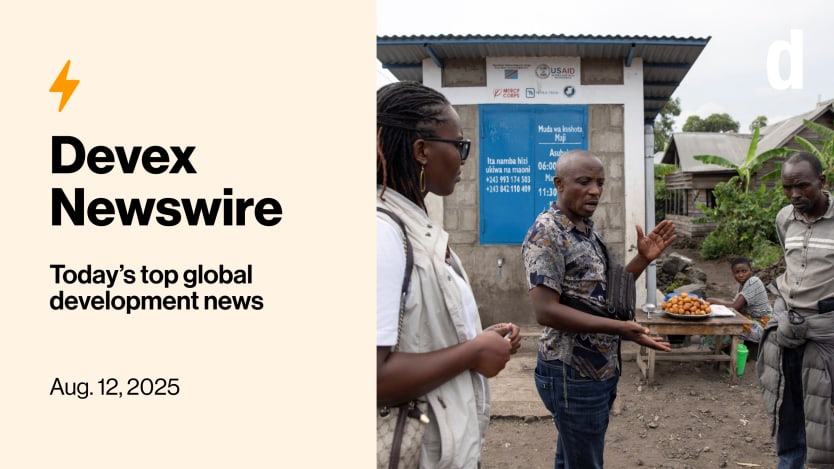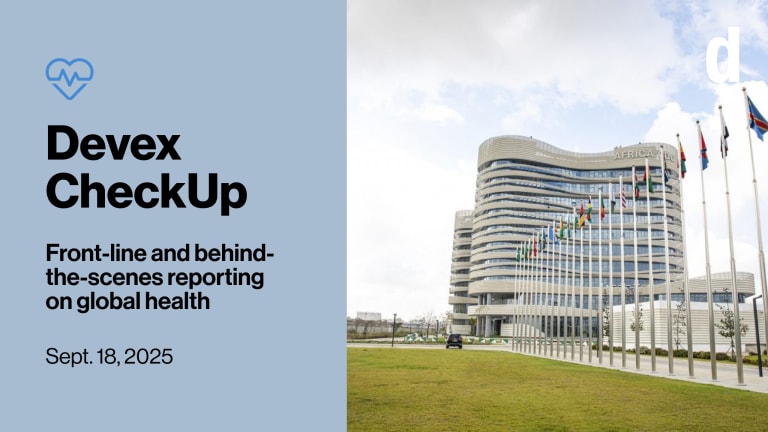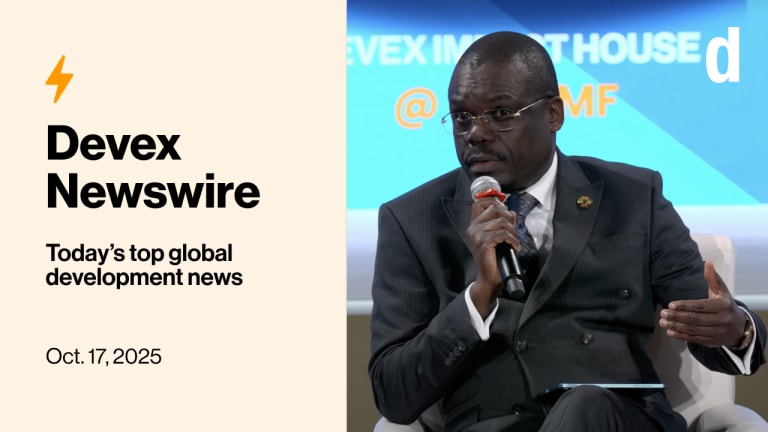
Top USAID officials took a trip to visit a slew of missions across the world — just as the agency was being shut down, leading some to wonder: What was the point, other than accumulating airline miles?
Also in today’s edition: Democrats say DOGE racked up waste in its quest to root out waste, and we hear from the head of Africa CDC on the agency's progress in cementing its role and relevance.
+ Join us today at 10 a.m. ET (4 p.m. CET) for a Devex Pro Briefing that will unpack the key questions surrounding Washington’s “trade, not aid” strategy shift in Africa. There’s still time to save your spot.
Departure delay
U.S. government officials routinely visit programs and staff at missions abroad to see how things are going. Visiting those missions when their lead agency is defunct — and most of its programs and staff are out the door — seems like a moot point.
At least that’s how some viewed the world tour that top USAID officials recently took as they visited missions from the Philippines to El Salvador just days after the agency formally ceased to exist on July 1.
Theoretically, if the trip had been done in advance, the purpose could’ve been to figure out the best way to wind things down. But some officials my colleague Elissa Miolene spoke to said that didn’t appear to be the case.
“It’s like a victory lap, and to be able to go to Congress and say, ‘Hey, we oversaw an orderly transition from USAID to the State Department,’” said a senior official at one of those missions. “But there’s nothing orderly about this.”
“A trip like this could have been a lot more useful if it was done three or four months earlier, so there was time … to do something with our feedback,” said another senior official at a different mission. “They’re starting to ask questions, but they’re starting too late. And now, we’re all on our way out.”
The State Department was mum on the purpose of the trip, which took Ken Jackson, USAID’s deputy administrator for management and resources, Marcus Thornton, USAID’s deputy chief of staff, and at least two other newly appointed USAID officials to Belgium, El Salvador, Egypt, Guatemala, Jordan, Kazakhstan, Kenya, the Philippines, and Senegal.
Why those countries? Also unclear.
In line with the mass reduction-in-force of USAID staff, most mission directors are leaving their posts, while thousands of terminated programs are being transferred to a “legacy organization” for closure, according to an internal document obtained by Devex in June.
This legacy organization will essentially be a hollowed-out version of USAID, functioning out of Washington, D.C., with limited staffing to “close out and retire all remaining USAID assets and liabilities” — a process expected to take two years and cost the U.S. government an estimated $6.4 billion.
Exclusive: USAID officials tour missions worldwide as agency shutters
ICYMI: State Dept takeover of USAID is an 'impending train wreck,' experts say (Pro)
The cost of cost savings
$21.7 billion
—That’s how much a group of Democratic senators says the Department of Government Efficiency spent in taxpayer money in the name of efficiency.
Some $6 billion of that total was spent on the 100,000 federal workers placed on administrative leave over the last six months, including the vast majority of staff at USAID. Other multimillion-dollar losses were the result of spoiled food aid, incinerated health commodities, and lost time due to DOGE-launched initiatives.
Read: Lawmakers accuse DOGE of wasting $21.7 billion in six months
Age-defying
Dr. Jean Kaseya, the director-general of the Africa Centres for Disease Control and Prevention, has big ambitions for his young agency — which seems only fitting considering that it aims to represent the health needs of a continent of 1.4 billion people.
However, maturity often comes with progress and pain, both of which Kaseya discussed at a recent Devex Pro Briefing, where he wasn’t shy about touting Africa CDC’s growing stature as an autonomous arm of the African Union.
“We are the convening power in Africa,” he said. “No one can come today again to work in Africa without Africa CDC. It doesn’t make sense.”
But the agency still has hurdles to navigate, from taking more of its own financial reins to quelling concerns about Kaseya’s leadership style.
On top of that is the tsunami of foreign assistance cuts hitting the continent.
Kaseya was candid that “surely, some people will die because of the aid cuts,” and many of those deaths could’ve been prevented if it weren’t for the suddenness of the cuts. But he believes the impact can still be mitigated if Africa takes collective action.
In fact, he said he saw the writing on the wall even before U.S. President Donald Trump’s aid purge. Kaseya said the manifesto he wrote for his candidacy for the Africa CDC director-general role addressed this very issue.
“We need to stop with dependency. We need to start to think how Africans can invest in their health system,” he said. “Yes, we are suffering from these aid cuts, but it’s a major wake-up [call] for us now to take back our sovereignty.”
Watch: Africa CDC chief on health agency’s past problems and promising future (Pro)
+ Not yet a Devex Pro member? Start your 15-day free trial today to access all our expert analyses, insider insights, funding data, events, and more. Check out all the exclusive content available to you.
Grassroots, gutted
The smallest African civil society organizations — those with an annual budget of under $250,000 — were the hardest hit by cuts to USAID, according to a new survey of over 360 nonprofits on the continent. That includes those who weren’t direct recipients of U.S. funding, but felt the ripple effects shake the aid system from January until today.
“We have no tangible answer to the USG funding cuts,” one survey participant stated, referring to the U.S. government. “Many of us are begging for survival because all hopes were smashed as we never planned alternatives. We tried to save funds for sustainability, but we were not allowed.”
The survey — which was pulled together by EPIC Africa, AfricanNGOs, and Firelight — found that 64% of those nonprofits face “existential risk” as a result of USAID’s dismantling, and that for at least 1 in 5 civil society organizations, entire program areas collapsed.
But even so, some are looking at new ways of forging forward. Twenty-three percent of organizations, for example, are increasing local fundraising, while 18% have secured alternative sources of funding.
Related: ‘Like a big funeral’ —USAID cuts leave local partners fighting to survive (Pro)
‘Constructive’ but cautious
The United Nations — not to mention numerous aid groups — have criticized the Israel- and U.S.-backed Gaza Humanitarian Foundation for going against humanitarian principles and putting Palestinian lives at risk.
But could a thaw be in the works?
Last week, several U.N. agencies and aid organizations met with the GHF for a conversation that was “constructive, open, and we believe helpful,” wrote UNOCHA’s Joyce Msuya and InterAction’s Tom Hart in an email — obtained by Devex — following the meeting. “We agreed it would be good for all to lower the public rhetoric and to focus on moving forward rather than what has happened or said previously.”
But the email also cautioned: “Fuller collaboration was raised without clarity on what that would mean.”
Likewise, the U.N. wasn’t exactly effusive in its expectations for the tête-à-tête. Stephanie Tremblay, the associate spokesperson for the U.N. secretary-general, confirmed the private meeting, which was “held at the invitation” of the U.S. Mission to the United Nations.
“We welcome anyone raising their voice to urgently reach the civilians across Gaza with humanitarian assistance,” Tremblay told reporters. “But as we’ve said repeatedly, we already have a plan built on global humanitarian principles. That means we go where the needs are the greatest, we answer to civilians in need and not the warring parties, and there’s no change to our principled approach.”
Read: After weeks of tension, UN leaders talk to controversial Gaza aid group
ICYMI: NGOs call Germany's air drop into Gaza a ‘bland populist move’
In other news
Irish Prime Minister Micheál Martin has urged the release of aid worker Gena Heraty, who was kidnapped by suspected gang members in Haiti, where she has spent 30 years running an orphanage for children with special needs. [BBC]
U.K. foreign secretary David Lammy could face legal action over a controversial plan to embed staff from major private firms such as Shell and BAE Systems in the Foreign, Commonwealth & Development Office, which could be in breach of the civil service code. [The Guardian]
Following France and the United Kingdom, Australia announced it will recognize Palestinian statehood at the U.N. General Assembly in September. [CNN]
Sign up to Newswire for an inside look at the biggest stories in global development.
Search for articles
Most Read
- 1
- 2
- 3
- 4
- 5








